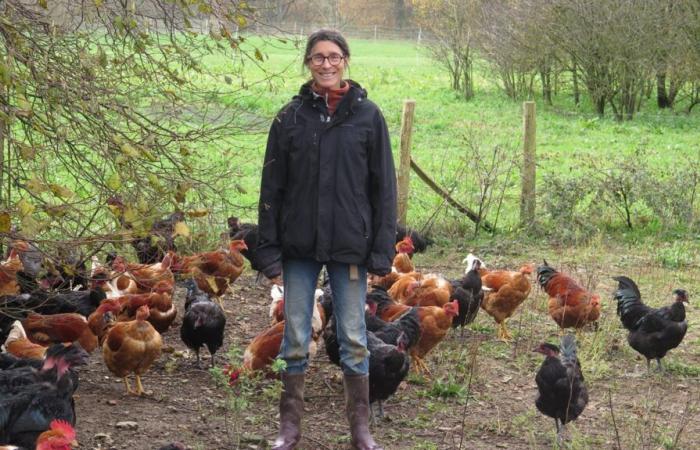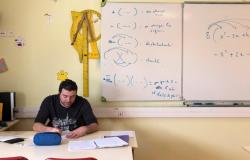The Deux-Sèvres department, hit hard in the past by avian flu, was spared in 2024. “There have been no outbreaks in livestock or cases reported in wildlife,” confirms the prefecture. The last case in Deux-Sèvres goes back “at the beginning of 2023”. The subject, however, remains closely monitored in a department which has “around 850 poultry farms”. Among them, “200 are subject to preventive vaccination”farms of more than 250 ducks.
“Certain species like ducks spread the virus more. Vaccination is what allowed there to still be a poultry industry in France. It has benefited the entire sector. The results are there, it’s convincing, observes Mickaël Gatard, breeder at Forêt-sur-Sèvre and president of the poultry section at the FNSEA79. We always have a sword of Damocles hanging over our heads, we must not relax our vigilance, but vaccination allows us to see the future more calmly. »
“Locking up our animals doesn’t suit us”
With its 30,000 ducks in Augé, the family business Chez Morille is affected by the vaccination obligation. “All ducks have been vaccinated since 1is October 2023 with the natural vaccine; it protects almost the entire sector” welcomes Jean-Robert Morille, while regretting that this does not make it possible to lift the ban on taking his ducks out into the fresh air.
Indeed, despite the absence of cases in the department, all species of poultry must be reconfined since November 9, 2024 throughout France. The consequence of the transition from a “moderate” to “high” risk decided by the State with regard to a few cases in Brittany, Landes and Allier since August 2024.
“The vaccine has played its role. We now hope that the good results of the vaccination will allow the administration to be more flexible in order to be able to keep our poultry outside! calls for Jean-Robert Morille. Locking up our animals doesn’t suit us. The essence of breeding is outdoors”. He welcomes an experiment obtained by outdoor breeder collectives and the Peasant Confederation. “It’s great, I hope it will help us move forward in this direction!” »
In Mazières-en-Gâtine, Hélène Bailly has the same hopes. Member of the Sauve qui Poule Poitou collective and co-secretary general of the Confédération paysanne des Deux-Sèvres, the breeder is participating in the national experiment. “The Peasant Confederation has obtained, from the Ministry of Agriculture, a budget of €700,000 to assess the risks in our free-range livestock farms. »
“There are breeders who stop, it affects morale”
A study was thus launched in 92 pilot farms in France, including six in Deux-Sèvres. “What is positive is that the State is interested in our livestock. Our goal is to change the regulations so that we can leave our poultry outside. » But she’s waiting to see what happens: “I regret that this is not a global and comparative experiment with other breeding methods. We don’t know what will come out of this. »
Free-range farms still refuse to undergo repeated confinements. “They have the wrong targets,” deplores Hélène Bailly, wanting as proof that “almost all of the farms affected by the disease were not free-range”.
The breeding method would offer advantages: “Our farms are self-sufficient. We receive the chicks at one day old and we just take them out for the slaughterhouse. There are no movements between the two. In large farms, veterinarians come every month, they do a lot of treatments, they have a lot of visits. » With a deemed increased risk of virus transmission from one site to another.
“Already, our poultry have less risk of catching the disease because we have less movement with the outside world and almost no risk of spreading it since we are in a closed environment. » Past epidemics have demonstrated this: “By having kept our poultry outside, we did not have any cases even though it was flaring up all around in enclosed farms. »
But the outdoor model suffers: “With their standards, they slow down installations and transmissions. There are even breeders who stop, it affects morale.”
92 “pilot farms” in France
An experiment was launched in 92 “pilot farms” in France to assess the risks linked to avian flu in free-range poultry farms at the request of the Confédération paysanne and collectives such as “Sauve qui Poule”.
Hélène Bailly, breeder in Mazières-en-Gâtine, is one of the six “pilot farms” in Deux-Sèvres selected for this national experiment.
“In April 2024, referents appointed by the ministry came to carry out a diagnosis of our practices to assess, in their opinion, the risks. For example, on those linked to transport, we were good but less on those linked to contact with wild birds.”
This resulted in “ four concrete measures for each pilot farm » for the experiment, from November 2024 to February 2025 with results expected in May 2025.
The first: “We count the wild birds seen for ten minutes every two weeks at three different points.”
The second: “a sanitary analysis of the cabins at the beginning and end of the crawl space”. She leaves a three-month gap between each batch, cleaning with a hose and moving the cabins. “They would like us to use a super-powerful disinfectant”which she refuses. “To disinfect is to unbalance the existing bacteriological balance”.
The third is “experimenting with composting on the farm” in case of dead animals. “We are fighting so that rendering trucks do not come to our farms” seen as posing a risk of spreading viruses.
The fourth is to observe the condition of the animals. “For us, this is the most important point. I have hardy strains, I never use antibiotics or other chemical treatments. My poultry are not sick and there is no mortality. Our farms are in good health. If a virus arrived, they would have better immunity. »






